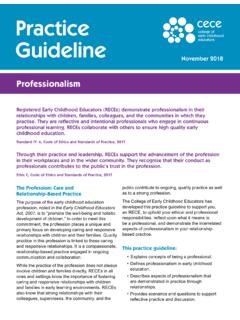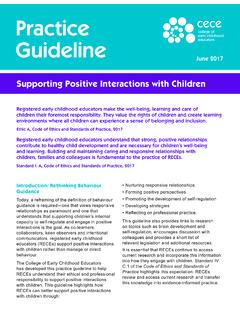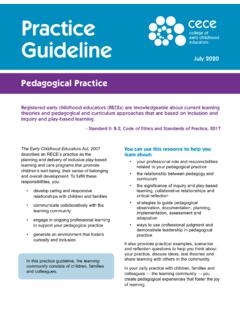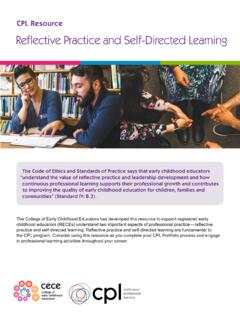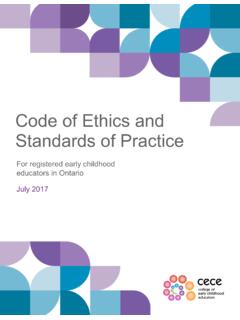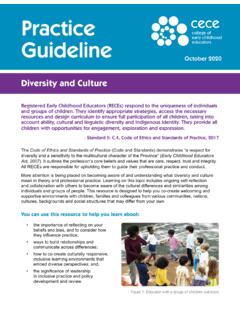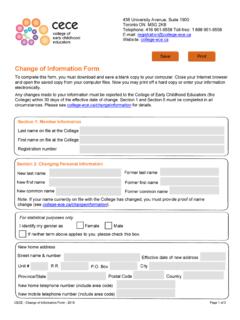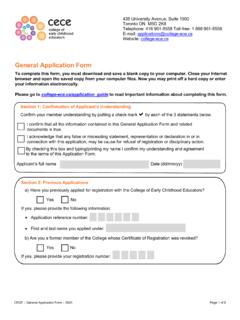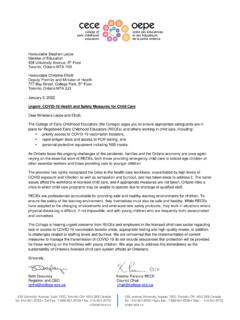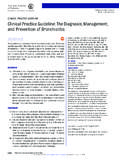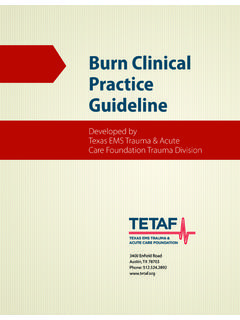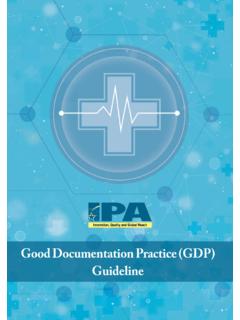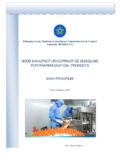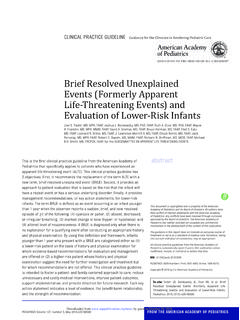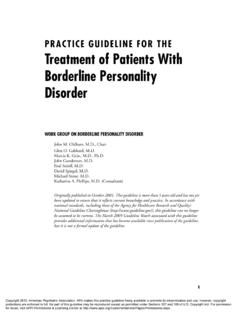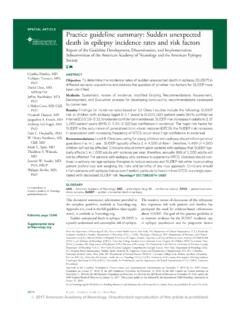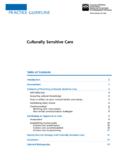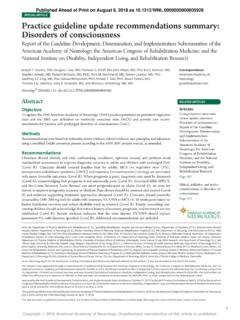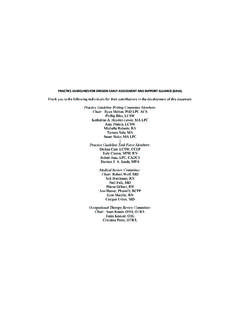Transcription of Practice Guideline - college-ece.ca
1 Practice GuidelineIntroduction: Rethinking Behaviour Guidance Today, a reframing of the definition of behaviour guidance is required one that views responsive relationships as paramount and one that understands that supporting children s internal capacity to self-regulate and engage in positive interactions is the goal. As co-learners, collaborators, keen observers and intentional communicators, registered early childhood educators (RECEs) support positive interactions with children rather than manage or direct behaviour. The College of Early Childhood Educators has developed this Practice Guideline to help RECEs understand their ethical and professional responsibility to support positive interactions with children. This Guideline highlights how RECEs can better support positive interactions with children through: Nurturing responsive relationships Forming positive perspectives Promoting the development of self-regulation Developing strategies Reflecting on professional Practice .
2 This Guideline also provides links to research on topics such as brain development and self-regulation, encourages discussion with colleagues and provides a short list of relevant legislation and additional resources. It is essential that RECEs continue to access current research and incorporate this information into how they engage with children. Standard IV: of the Code of Ethics and Standards of Practice highlights this expectation: RECEs review and access current research and transfer this knowledge into evidence-informed Practice . Registered early childhood educators make the well-being, learning and care of children their foremost responsibility. They value the rights of children and create learning environments where all children can experience a sense of belonging and inclusion. Ethic A, Code of Ethics and Standards of Practice , 2017 Registered early childhood educators understand that strong, positive relationships contribute to healthy child development and are necessary for children s well-being and learning.
3 Building and maintaining caring and responsive relationships with children, families and colleagues is fundamental to the Practice of RECEs. Standard I: A, Code of Ethics and Standards of Practice , 2017 Supporting Positive Interactions with Children June 20171 Introduction: Rethinking Behaviour Guidance3 Responsive Relationships4 Positive Perspectives7 Supporting Self-Regulation 9 Positive Interactions: Reflecting on StrategiesPractice guidelines communicate certain expectations of registered early childhood educators (RECEs) as outlined in the Code of Ethics and Standards of Practice . guidelines also highlight how those expectations may be applied in Practice . They include recommended practices and provide opportunities for self-reflection and professional learning. The Code of Ethics and Standards of Practice , current research and related legislation should be consulted when considering Practice guidelines .
4 Practice guidelines support the College s role to promote high standards, continuous professional learning and govern the conduct of RECEs. About this Publication13 Scenarios for Reflection 17 Related Legislation 19 Moving Forward in Practice 20 References and Resources Visit to access all the resources and videos in this Relationships Fostering good relationships with children and their families is the single most important priority for educators in early years programs. A significant body of research indicates that positive, caring and respectful relationships are the foundation for optimal learning, development, health, and well-being. How Does Learning Happen? Ontario s Pedagogy for the Early YearsDeveloping responsive relationships is a daily focus for RECEs working directly with children and families and it is an essential building block for supporting positive interactions. Standard I: of the Code of Ethics and Standards of Practice confirms this commitment, stating that early childhood educators are knowledgeable about a range of strategies that support ongoing positive interactions with children and families.
5 Building relationships takes time, flexibility and a willingness to stop, listen and be present in the moment. All too often developing responsive and authentic relationships with children takes a backseat to routines, transitions and programming expectations. Dr. Jean Clinton (2014a) clarifies the value of relationships: What responsive, nurturing [and] positive relationships mean [is] that you re focusing, as a priority, on the quality of your interactions. Reflect on the video Brain Development: Quality of Interactions as part of the Ontario Ministry of Education s resource Think, Feel, Act: Lessons from research about young this video, Dr. Clinton requests that educators shift their focus away from activities to be present, available and engage fully with children as the moment may require. She also highlights the importance of attending and responding to children immediately when they are showing they are in need of a supportive the words of Dr.
6 Chaya Kulkarni, Director of Infant Mental Health Promotion at the Hospital for Sick Children in Toronto, ON, who says that: RECEs must create responsive relationships, as unresponsive relationships can derail a child s development. (personal communication February 1, 2016)College of Early Childhood Educators | Practice Guideline : Supporting Positive Interactions with Children | June 2017 3 Positive PerspectivesIf RECEs respect and value children s abilities, they are more inclined to: Create opportunities for children to learn through play, based on their interests and what challenges them. Encourage meaningful and positive interactions with other children. Support children in developing internally motivated strategies for regulating their emotions and on the video Brain Development: Impact of our view of the child as part of the Ontario Ministry of Education s resource Think, Feel, Act: Lessons from research about young this video, Dr.
7 Clinton (2014b) talks about how we are moving to a relational-based educational system. She highlights the importance of the educator mindset allowing children to take the lead and follow their interests in order for increased learning and the experiences of joy to take RECEs prioritize quality relationships and interactions, it results in a positive view of the child, family and early childhood Children are competent, capable of complex thinking, curious and rich in How Does Learning Happen? Ontario s Pedagogy for the Early YearsWhile many RECEs already view children as competent and capable, this positive perspective needs to take center stage. This view contributes to the development of authentic relationships and positive interactions with children and families. It helps RECEs support children s ability to self-regulate. A positive view of children allows RECEs to plan curriculum based on meaningful interactions, interests and emerging skills rather than designing curriculum and interactions that may narrowly support developmental College of Early Childhood Educators | Practice Guideline : Supporting Positive Interactions with Children | June 2017 Visit to access all the resources and videos in this The first relationship in children s lives is with their families.
8 Building strong relationships with families takes commitment and reflection. RECEs must consider the ways that families uniquely contribute to the learning environment. Collaborating and co-learning with families supports RECEs in fostering positive interactions with children and allows for meaningful connections to be made between the home and the early learning environment. When families are provided with the opportunity to share information about their children, such as their temperament, interests or the challenges they face, RECEs deepen their relationships with children and strengthen their strategies to support positive interactions and on your interactions with families. What do you routinely do to involve families in your program? How can you strengthen your relationship with families? What have you learned from families? How does the information you have learned from families support your interactions with children?
9 College of Early Childhood Educators | Practice Guideline : Supporting Positive Interactions with Children | June 2017 5 Families are composed of individuals who are competent and capable, curious and rich in experience. They are the first and most powerful influence on children s learning, development, health, and How Does Learning Happen? Ontario s Pedagogy for the Early YearsEducators Educators are competent and capable, curious and rich in experience. They are knowledgeable, caring, reflective, and resourceful How Does Learning Happen? Ontario s Pedagogy for the Early YearsEducators must also reflect on the importance of their own role in a child s life. RECEs bring with them a wealth of knowledge and experience and are ready to support the development of children. RECEs are skilled communicators who model problem-solving strategies and co-regulate alongside children. When RECEs see themselves as competent, capable and resourceful professionals, they feel empowered and confident.
10 With a positive, professional self-image, RECEs are better able to support positive interactions with Kulkarni says that relationships drive brain architecture. Reflect on the research that concludes healthy brain development relies on the quality of relationships in a child s the Resource Library from the Centre on the Developing Child from Harvard on how you view yourself as an RECE. What are your strengths as a professional? What are your areas for growth? What coping strategies do you use for managing personal and professional stress? What resources can help you develop and support positive interactions with children? Responsive relationships and positive perspectives of the child, family and educator directly contribute to healthy brain development in children. Consider the research that links quality relationships with child College of Early Childhood Educators | Practice Guideline : Supporting Positive Interactions with Children | June 2017 Visit to access all the resources and videos in this Self-RegulationResearch shows there are many definitions of self-regulation.
